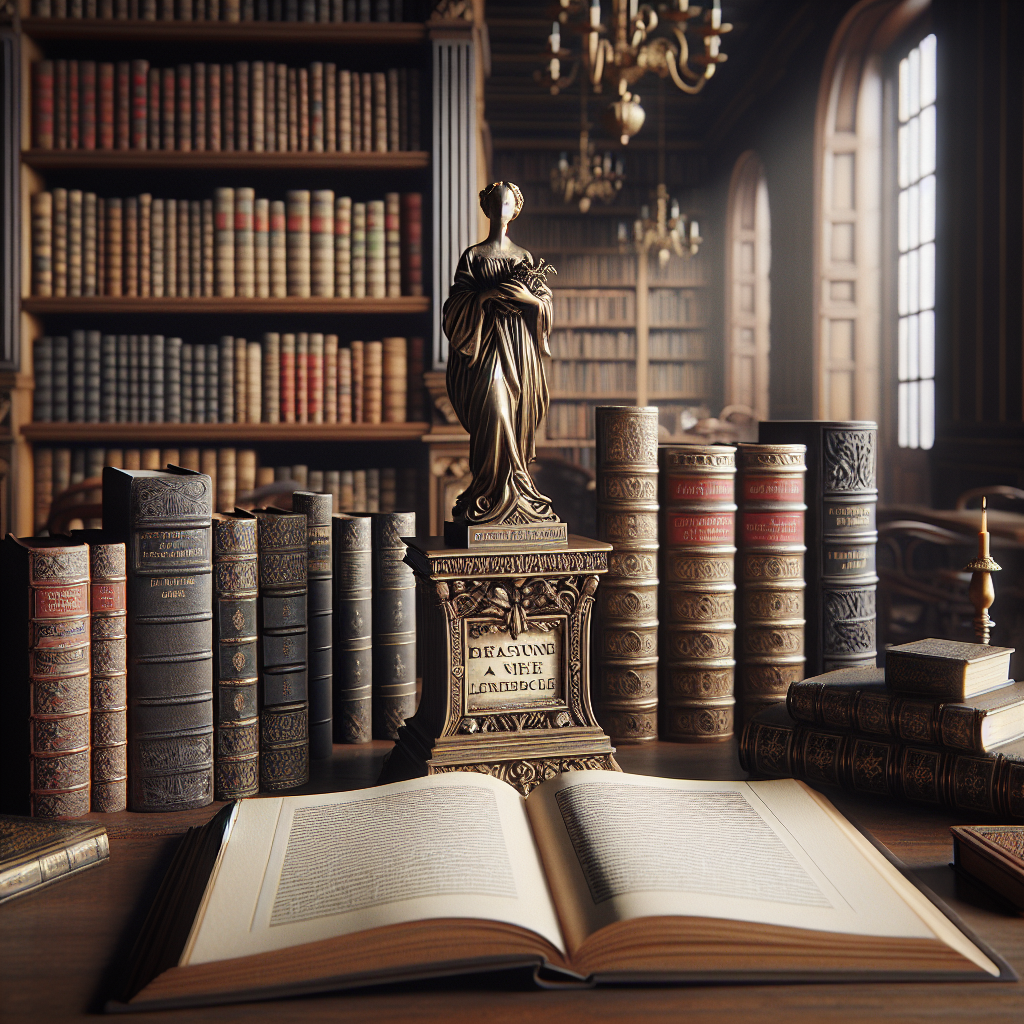John Milton: The Man Behind Paradise Lost
Early Life and Education
John Milton came into this world in 1608 in the bustling city of London. You could say he hit the jackpot being born into a fairly well-to-do family. His folks prioritized his brainpower early on, sending him to St. Paul’s School and then to Christ’s College, Cambridge. After snatching that M.A. degree, he didn’t just sit around. For six long years, he dove into books and hit the road, soaking up new languages and wandering around places like France and Italy. All those adventures and literary prowesses? Oh, they added a rich flavor to his work.
Milton’s schooling wasn’t just about filling up notebooks. It was the scaffolding that he built his genius on. The guy was a reading machine and had a knack for languages that made his storytelling pop, especially in his masterpiece Paradise Lost.
Political Involvement and Civil Service
When the English Civil War was kicking up a storm, Milton wasn’t just sitting in his study, twiddling his thumbs. He jumped into the political fray with both feet, shouting from the rooftops in favor of chopping off Charles I’s royal head and backing the Commonwealth. This earned him the fancy title of Secretary for Foreign Tongues. There, he penned down some spicy pamphlets to rally people behind the new republic (ThoughtCo).
When the monarchy made its comeback in 1660, things weren’t too rosy for Milton, given his political antics. But even losing his eyesight didn’t knock him out. He went back to politics in Oliver Cromwell’s time from 1653 to 1658. After Cromwell moved on from this mortal coil, Milton poured his heart and soul into Paradise Lost, finally seeing it in print in 1667. His days in the political hot seats? Those fueled the meaty themes of leadership, oppression, and freedom in Paradise Lost. Want to dig deeper into what he penned down over his lifetime? Check out our John Milton’s life and works.
Legacy of Paradise Lost
Creation of Epic Poetry
John Milton’s Paradise Lost is often seen as a massive triumph in epic poetry. It’s frequently ranked among the best of English works, because it tells the Bible’s tale of Adam and Eve’s fall from grace. Milton was so good with rhythm and sound that it made his poem a true masterpiece (Britannica).
He used blank verse and threw in some classical pizazz, shaking up the way epic stuff was written after him. Themes like free will, being obedient, and pushing back against divine powers are all peppered through it, stirring up a philosophical mix that still gets readers and writers talking.
Impact on English Literature
Paradise Lost stuck its flag deep in the ground of English literature, molding budding authors and lighting fires under literary movements. Diving into the mess of theological themes and moral head-scratchers has nudged many to think twice about good versus evil. Big shots like John Keats and Philip Pullman have tipped their hats to Milton for his trailblazing contributions (Britannica, BBC).
A lot of writers picked up the heavy themes and fancy imagery found in his work, anchoring Milton as a rock in English literary tradition. Authors are all about remixing the themes and vibes he laid down, and Milton’s stamp on literature still doesn’t fade.
Enduring Influence
Paradise Lost keeps its crown in classic literature, lighting a spark across the arts beyond just writing. The poem’s touched tons of artists with works like Joseph Haydn’s musical piece The Creation and John Keats’s poem Endymion catching Milton’s wave (Britannica). It doesn’t stop at storytelling, either—adaptations, critiques, and fresh spins on its themes show its life way beyond the original pages.
Milton raised some big questions that still echo today, stirring chats about right, wrong, and what it means to be human. His follow-up, Paradise Regained, which hones in on Christ’s temptation, locks him in as a deep thinker and stellar poet. If you’re curious about diving into Milton’s impact, check out his literary works or dig into his style.
Themes and Characters in Paradise Lost
Biblical Narrative of the Fall
“Paradise Lost” spins the epic tale of Adam and Eve’s fall from grace—a blockbuster of the literary world. Widely hailed as a masterpiece, its rhythms and melodies echo through the annals of English literature. Here, temptation, freedom, and redemption dance in a timeless saga, showcasing how a simple defiance sets humankind on a path away from Eden. Jumping straight into the thick of things, the poem shakes up moral and existential puzzles, making it a Christian classic.
Characterization of God and Satan
Meet the stars of the show: God, Satan, Adam, and Eve. Milton’s portrayal of Satan stirs up much chatter among book buffs and scholars. Some say he’s the real hero, pushing back against what they see as Heaven’s dictatorship (Britannica). This tangled depiction nudges readers to ponder power, rulership, and the meaning of freedom.
As for God, Milton paints Him as all-knowing and all-powerful, serving up justice and mercy with a side of divine flair. This tug-of-war between God and Satan highlights the push and pull between cosmic rule and personal choice, especially when it comes to doing one’s own thing. Here’s a quick snapshot of the main players:
| Character | Role | Description |
|---|---|---|
| God | Creator | Almighty being, the head honcho of authority |
| Satan | Rebel | Once an angel, now he’s the story’s bad guy |
| Adam | First Man | Stands for humanity’s bond with God |
| Eve | First Woman | Emblem of temptation and choice |
Modern Interpretations
Taking on fresh interpretations, “Paradise Lost” keeps evolving, with readers digesting and debating its messages in new lights. Themes of gender roles, imperialism, and evil are constantly explored, while Satan’s character continues to be dissected in terms of rebellion, choosing freely, and murky ethics. Not just a sacred text, the poem is a thrilling reflection on what it means to be human and live in society. Thinkers and poets, like William Blake, even crown Satan as the real star, throwing a wrench into the hero vs. villain debate.
For more on Milton’s mind-benders, check out our John Milton books or dive into the John Milton literary works for character analyses. If the nitty-gritty of his style intrigues you, don’t miss our article on John Milton style of writing.
Writing Style and Structure
Checking out the way words flow and line up in Paradise Lost shows why John Milton is still talked about as one of the top dogs in English poetry. His knack for blank verse, sprinkles of classic styles, and how folks have different takes on his work all make the poem hang around in the history books.
Blank Verse Poetry
Paradise Lost grooves in blank verse, which is just a fancy term for unrhymed iambic pentameter. This lets the poem groove with a rhythm that matches how we naturally talk. It’s like Milton gives us a poem that’s easy to get into, but still full of big fancy themes. This blank verse gives Milton the space to dive into deep stuff without getting tangled in rhymes. Originally, Paradise Lost came out as 10 books back in 1667 but was later stretched to 12 in 1674 when Books 7 and 10 were split, showing its growing narrative (Britannica).
Classical Elements
Milton’s Paradise Lost borrows heavily from the classics, giving it that epic flair:
| Thing | What’s Going On |
|---|---|
| 12-Book Setup | Following old-school epics, this setup adds layers and depth to the story. |
| Jumping in Mid-Action | Dropping us in the thick of things from the start keeps the energy high. |
| Shouting Out to the Muse | Milton kicks off by reaching out for some inspiration, a classic epic move. |
| The Big Question | Paradise Lost wrestles with big ideas like free will and justice, much like its epic cousins. |
While Adams and Eve’s tale is a Christian yarn, it dances differently than the usual mythological themes of the classics (Britannica).
Public Reception and Criticism
When Paradise Lost first dropped, people were mixed. Some got jazzed up by its grandeur and unique language tricks, while others raised eyebrows at its break from epic norms. Nowadays, it’s known not just for poetic flair but for its deep dive into philosophy and theology.
Through the years, Milton’s genius sparked all sorts of adaptations and spin-offs in music and writing, showing its hefty footprint on culture. Joseph Haydn’s oratorio The Creation and John Keats’s poem Endymion nod to Paradise Lost’s reach (Britannica).
To dive more into Milton’s magic touch in English literature, hop over to our stash of John Milton books and check out the nitty-gritty of his artistry in John Milton poetry analysis.
Milton’s Personal Life and Beliefs
Views on Marriage
John Milton was quite ahead of his time when it came to marriage. He caused quite a stir with his belief that couples should be allowed to split up if they just weren’t getting along. Talk about pushing the envelope! He thought meaningful conversation and mental connection were at the heart of a good marriage. This idea is central to Adam and Eve’s relationship in his famous poem, Paradise Lost (Sparknotes).
| Aspect of Marriage | Milton’s Take |
|---|---|
| Divorce Rights | Supported divorce for incompatibility |
| Importance of Companionship | Valued conversation and mental harmony |
Linguistic Expertise
Milton wasn’t just content with writing in English; he practically threw a party with languages. Here’s a list of the impressive lineup:
| Language | Noteworthy Details |
|---|---|
| Italian | Shaped his early poetry and writings |
| Greek | Critical for dipping into ancient literature |
| Latin | Popped up a lot in his scholarly work |
| Aramaic | His interest in ancient tongues |
| Hebrew | Key for religious deep dives |
| French | Boosted his multilingual flair |
| Spanish | Enriched his literary range |
| Anglo-Saxon | Kept him tied to his English roots |
| Dutch | Broadened his language skills |
His knack for languages didn’t just pepper his writing; it showed his hunger for knowledge and curiosity about different cultures.
Faith and Religious Influence
Milton’s faith was like the secret sauce in his literary recipe. He saw poetry as more than just words; it was a way to voice social, philosophical, and religious thoughts. His creations, especially Paradise Lost, reflect his unshakable faith in God and writing’s purpose being more than entertainment. Milton’s writing style was steeped in his beliefs, making the themes and stories all the richer. For more about his works, check out these goodies on John Milton Literary Works and John Milton Quotes.

